Search titles
Displaying results 1 to 10 of 61.
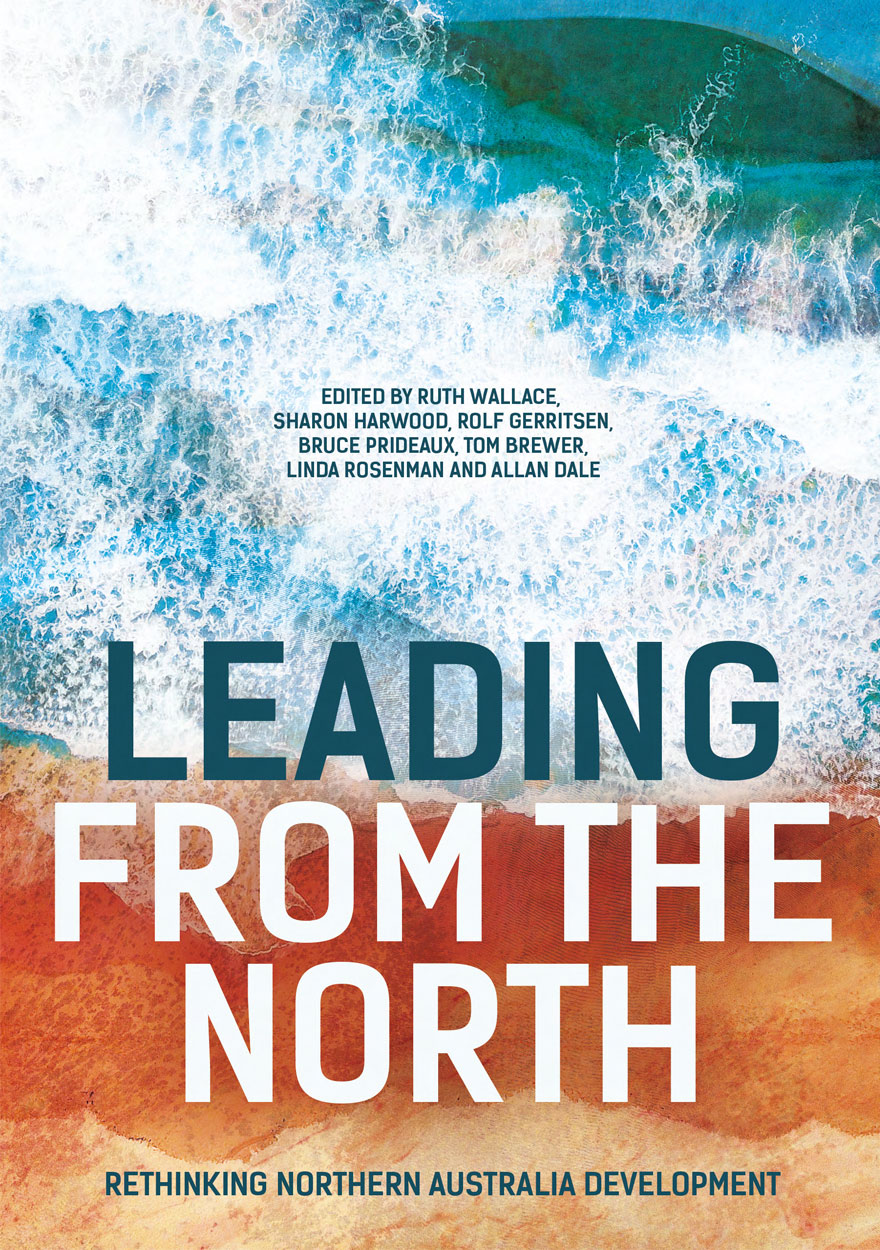
Leading from the North »
Rethinking Northern Australia Development
Edited by: Ruth Wallace, Sharon Harwood, Rolf Gerritsen, Bruce Prideaux, Tom Brewer, Linda Rosenman, Allan Dale
Publication date: September 2021
Leading from the North aims to improve public dialogue around the future of Northern Australia to underpin robust and flexible planning and policy frameworks. A number of areas are addressed including social infrastructure, governance systems, economic, business and regional development, climate and its implications, the roles and trends in demography and migration in the region.
This book not only speaks to the issues of development in Northern Australia but also other regional areas, and examines opportunities for growth with changing economies and technologies.
The authors of this book consist of leading researchers, academics and experts from Charles Darwin University, The Australian National University, James Cook University, the Australian Institute of Marine Science and many other collaborative partners.
Many of the authors have first-hand experience of living and working in Northern Australia. They understand the real issues and challenges faced by people living in Northern Australia and other similar regional areas. Backed by their expertise and experience, the authors present their discussions and findings from a local perspective.

Divided Loyalties »
Displacement, belonging and citizenship among East Timorese in West Timor
Authored by: Andrey Damaledo
Publication date: September 2018
Drawing on extensive ethnographic fieldwork, this study explores the ideas of belonging and citizenship among former pro-autonomy East Timorese who have elected to settle indefinitely in West Timor. The study follows different East Timorese groups and examines various ways they construct and negotiate their socio-political identities following the violent and destructive separation from their homeland. The East Timorese might have had Indonesia as their destination when they left the eastern half of the island in the aftermath of the referendum, but they have not relinquished their cultural identities as East Timorese. The study highlights the significance of the notions of origin, ancestry and alliance in our understanding of East Timorese place-making and belonging to a particular locality. Another feature of belonging that informs East Timorese identity is their narrative of sacrifice to maintain connections with their homeland and move on with their lives in Indonesia. These sacrificial narratives elaborate an East Timorese spirit of struggle and resilience, a feature further exemplified in the transformation of their political activities within the Indonesian political system.

Road Pricing and Provision »
Changed Traffic Conditions Ahead
Edited by: Michael de Percy, John Wanna
Publication date: July 2018
Road pricing is not a new concept—toll roads have existed in Australia since Governor Macquarie established one from Sydney to Parramatta in 1811—and distance-based charging schemes have been trialled and implemented with varying success overseas.
But how would full market reform of roads look in a federation like Australia? In its responses to the 2016 Australian Infrastructure Plan and the 2015 Competition Policy Review, the Australian Government explicitly supported investigating cost-reflective road pricing as a long-term reform option, and has committed to establishing a study chaired by an eminent Australian to look into the potential impacts of road pricing reform on road users. The challenges we face in this space are manifold and complex, and we still have a long road ahead of us. However, with advocacy for reform coming from interest groups as diverse as governments, private transport companies, peak industry bodies, policy think tanks and state motoring clubs, there is now more support than ever before for changing the way we provide for and fund our roads.
This book seeks to advance the road reform agenda by presenting some of the latest thinking on road pricing and provision from a variety of disciplinary approaches—researchers, economists and public sector leaders. It stresses the need for reform to ensure Australians can enjoy the benefits of efficient and sustainable transport infrastructure as our population and major metropolitan cities continue to grow. Traffic congestion is avoidable, but we must act soon. The works presented here all point to the need for change—the expertise and the technology are available, and the various reform options have been mapped out in some detail. It is time for the policy debate to shift to how, rather than if, road reform should progress.
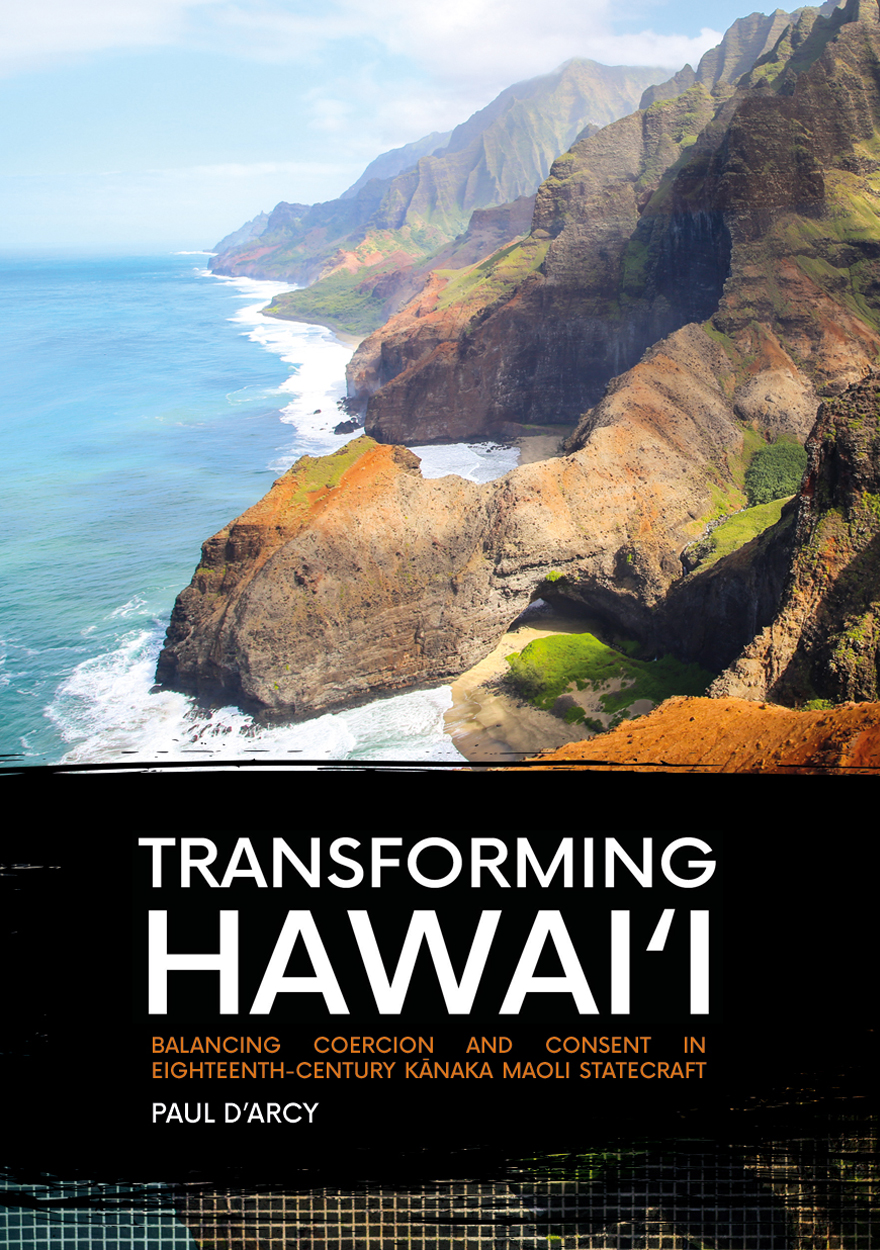
Transforming Hawai‘i »
Balancing Coercion and Consent in Eighteenth-Century Kānaka Maoli Statecraft
Authored by: Paul D’Arcy
Publication date: June 2018
This study examines the role of coercion in the unification of the Hawaiian Islands by Kamehameha I between 1782 and 1812 at a time of increasing European contact. Three interrelated themes in Hawaiian political evolution are examined: the balance between coercion and consent; the balance between general structural trends and specific individual styles of leadership and historical events; and the balance between indigenous and European factors. The resulting synthesis is a radical reinterpretation of Hawaiian warfare that treats it as an evolving process heavily imbued with cultural meaning. Hawaiian history is also shown to be characterised by fluid changing circumstances, including crucial turning points when options were adopted that took elements of Hawaiian society on paths of development that proved decisive for political unification. These watershed moments were neither inevitable nor predictable. Perhaps the greatest omission in the standard discourse on the political evolution of Hawaiian society is the almost total exclusion of modern indigenous Hawaiian scholarship on this topic. Modern historians from the Hawai‘inuiākea School of Hawaiian Knowledge at the University of Hawai‘i at Mānoa argue that political leadership and socioeconomic organisation were much more concensus-based than is usually allowed for. Above all, this study finds modern indigenous Hawaiian studies a much better fit with the historical evidence than more conventional scholarship.
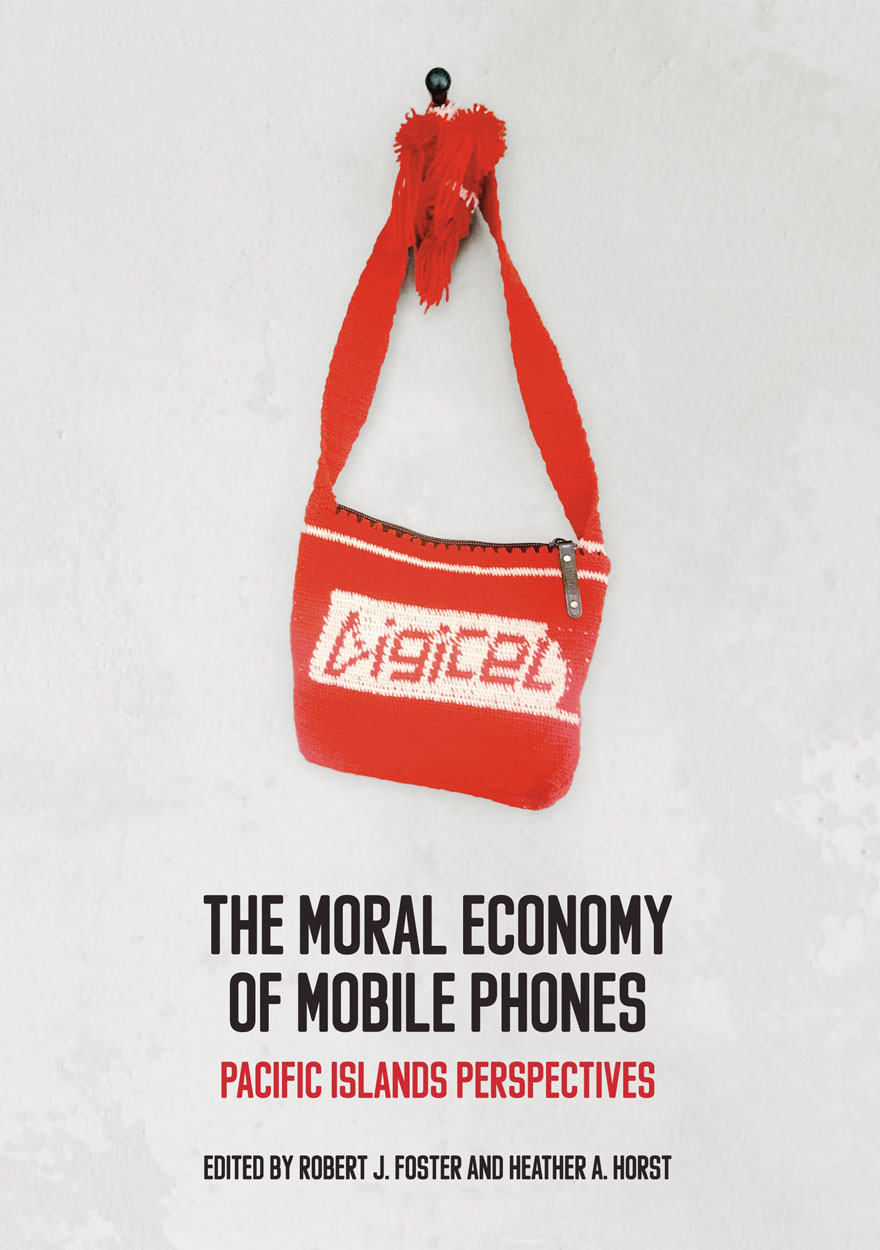
The Moral Economy of Mobile Phones »
Pacific Islands Perspectives
Edited by: Robert J. Foster, Heather A. Horst
Publication date: May 2018
The moral economy of mobile phones implies a field of shifting relations among consumers, companies and state actors, all of whom have their own ideas about what is good, fair and just. These ideas inform the ways in which, for example, consumers acquire and use mobile phones; companies promote and sell voice, SMS and data subscriptions; and state actors regulate both everyday use of mobile phones and market activity around mobile phones. Ambivalence and disagreement about who owes what to whom is thus an integral feature of the moral economy of mobile phones. This volume identifies and evaluates the stakes at play in the moral economy of mobile phones. The six main chapters consider ethnographic cases from Papua New Guinea, Fiji and Vanuatu. The volume also includes a brief introduction with background information on the recent ‘digital revolution’ in these countries and two closing commentaries that reflect on the significance of the chapters for our understanding of global capitalism and the contemporary Pacific.
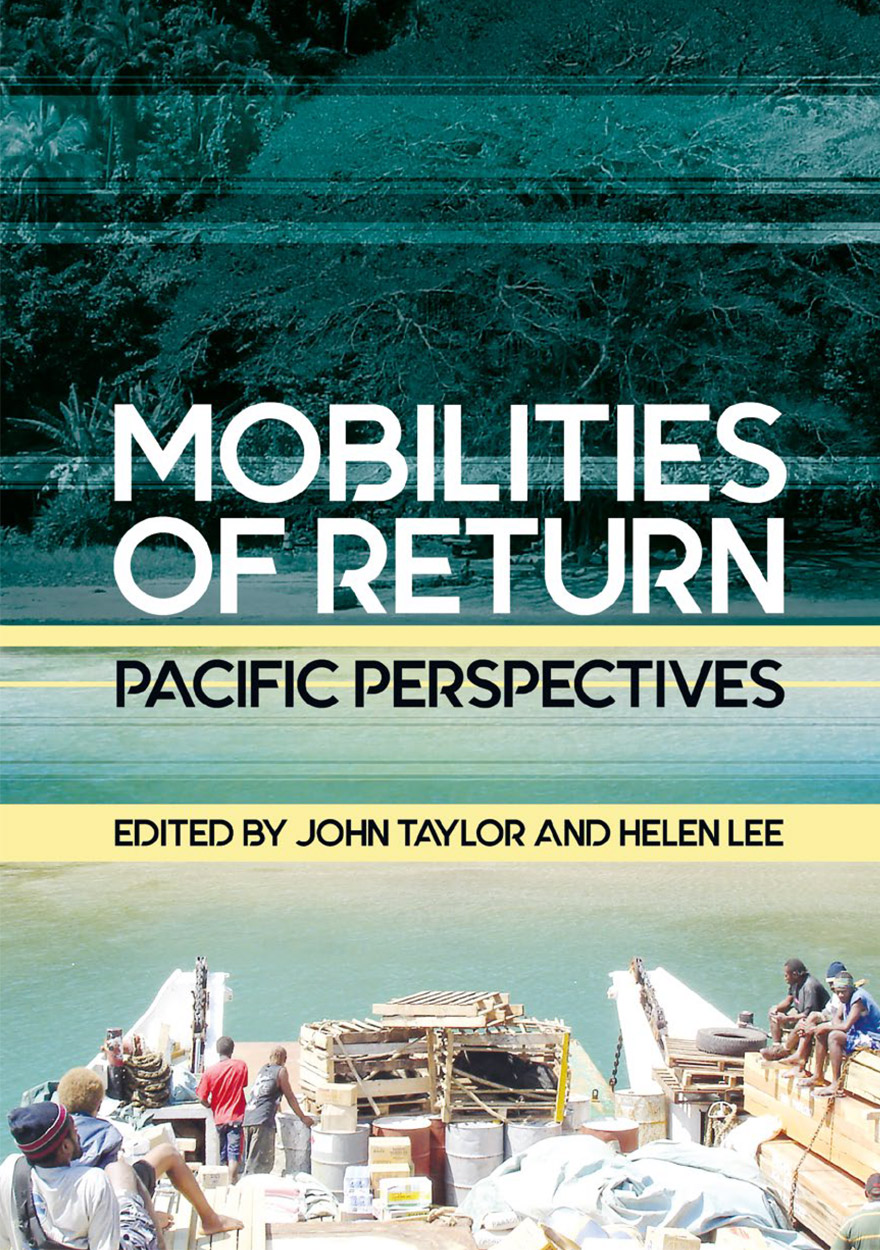
Mobilities of Return »
Pacific Perspectives
Edited by: John Taylor, Helen Lee
Publication date: December 2017
In recent decades, the term ‘mobility’ has emerged as a defining paradigm within the humanities. For scholars engaged in the multidisciplinary topics and perspectives now often embraced by the term Pacific Studies, it has been a much more longstanding and persistent concern. Even so, specific questions regarding ‘mobilities of return’—that is, the movement of people ‘back’ to places that are designated, however ambiguously or ambivalently, as ‘home’—have tended to take a back seat within more recent discussions of mobility, transnationalism and migration.
This volume situates return mobility as a starting point for understanding the broader context and experience of human mobility, community and identity in the Pacific region and beyond. Through diverse case studies spanning the Pacific region, it demonstrates the extent to which the prospect and practice of returning home, or of navigating returns between multiple homes, is a central rather than peripheral component of contemporary Pacific Islander mobilities and identities everywhere.
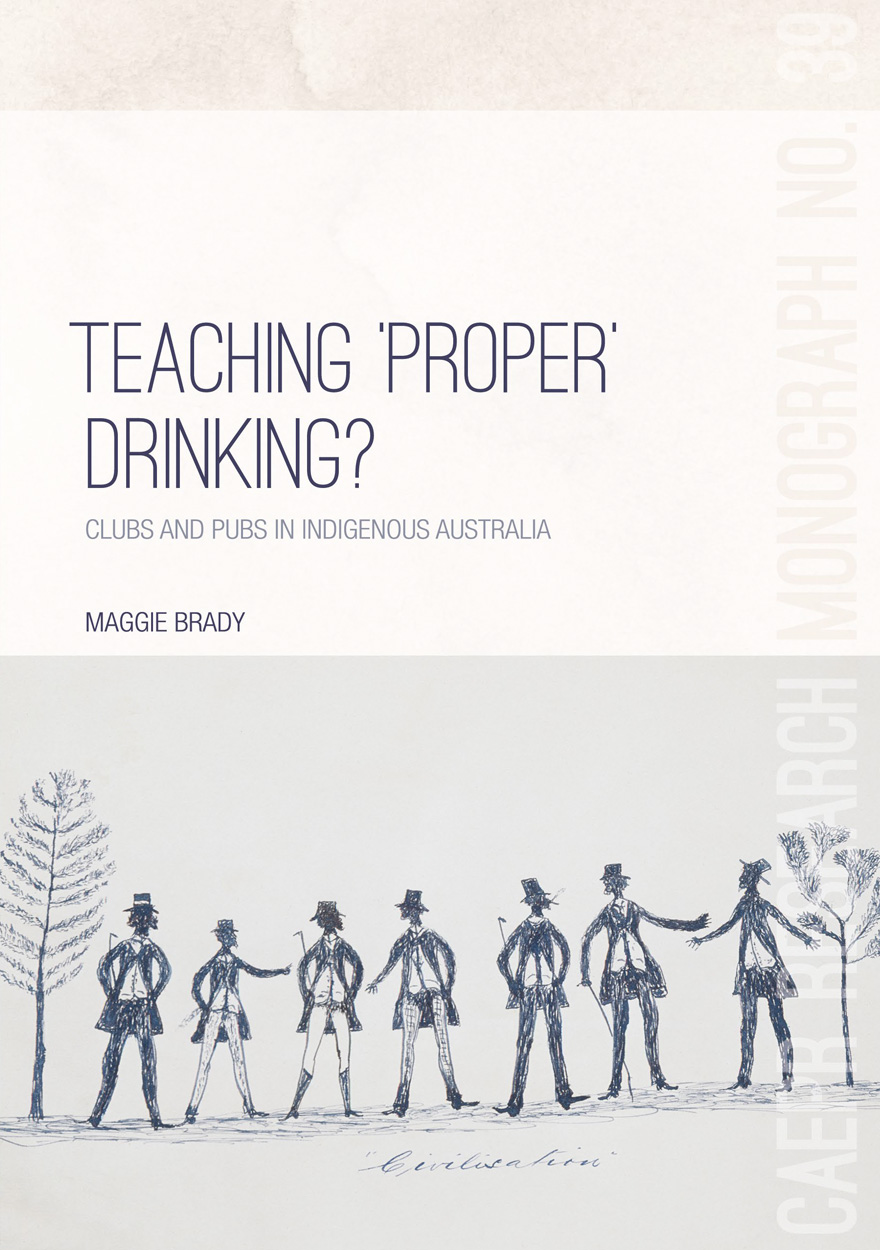
Teaching ‘Proper’ Drinking? »
Clubs and pubs in Indigenous Australia
Authored by: Maggie Brady
Publication date: December 2017
In Teaching ‘Proper’ Drinking?, the author brings together three fields of scholarship: socio-historical studies of alcohol, Australian Indigenous policy history and social enterprise studies. The case studies in the book offer the first detailed surveys of efforts to teach responsible drinking practices to Aboriginal people by installing canteens in remote communities, and of the purchase of public hotels by Indigenous groups in attempts both to control sales of alcohol and to create social enterprises by redistributing profits for the community good. Ethnographies of the hotels are examined through the analytical lens of the Swedish ‘Gothenburg’ system of municipal hotel ownership.
The research reveals that the community governance of such social enterprises is not purely a matter of good administration or compliance with the relevant liquor legislation. Their administration is imbued with the additional challenges posed by political contestation, both within and beyond the communities concerned.
‘The idea that community or government ownership and management of a hotel or other drinking place would be a good way to control drinking and limit harm has been commonplace in many Anglophone and Nordic countries, but has been less recognised in Australia. Maggie Brady’s book brings together the hidden history of such ideas and initiatives in Australia … In an original and wide-ranging set of case studies, Brady shows that success in reducing harm has varied between communities, largely depending on whether motivations to raise revenue or to reduce harm are in control.’
— Professor Robin Room, Director, Centre for Alcohol Policy Research, La Trobe University
In the Media
Read the Alice Spring News article: ‘Proper’ drinking: elusive goal but how hard have we tried?
Awards
Shortlisted – 2019 Chief Minister's Northern Territory History Book Award

War and Other Means »
Power and violence in Houaïlou (New Caledonia)
Authored by: Michel Naepels
Publication date: October 2017
War and Other Means describes and analyses the practices of war, the ‘objects of war’ and the conventions of the use of violence in Houaïlou, New Caledonia. It focuses on the colonial repression conducted in 1856 and after, the anti-sorcerer hunt in 1955, the independence mobilisation in the 1980s and the village feuds in the 2000s. Through this archaeology of violence, it reports on the practical inventiveness, intelligence and cunning of the Kanaks involved in social, often violent, conflicts. The use of archival material and recourse to the oral stories gathered from the inhabitants of Houaïlou restores the depth of these historical moments and the nested contexts of the political action that unfolded; it also questions the value and limits of fieldwork investigation.
These episodes are moments of change in the social, administrative, land and political organisation of New Caledonia; they make it possible to understand, from France’s takeover to the present day, the real modalities of implementation of colonial and postcolonial governmentality. The attention given to the invention, the importation or the adaptation of repressive techniques, closely linked to the French experience in Algeria, opens up a geopolitics of colonisation. Through this detailed description of the social logics of conflict, Michel Naepels also invites us to reflect on the place of European fantasies on violence and on the representations of otherness.
For the French edition, Conjurer la guerre. Violence et pouvoir à Houaïlou (Nouvelle-Calédonie), published by Éditions de l’École des hautes études en sciences sociales, please visit editions.ehess.fr/ouvrages/ouvrage/conjurer-la-guerre
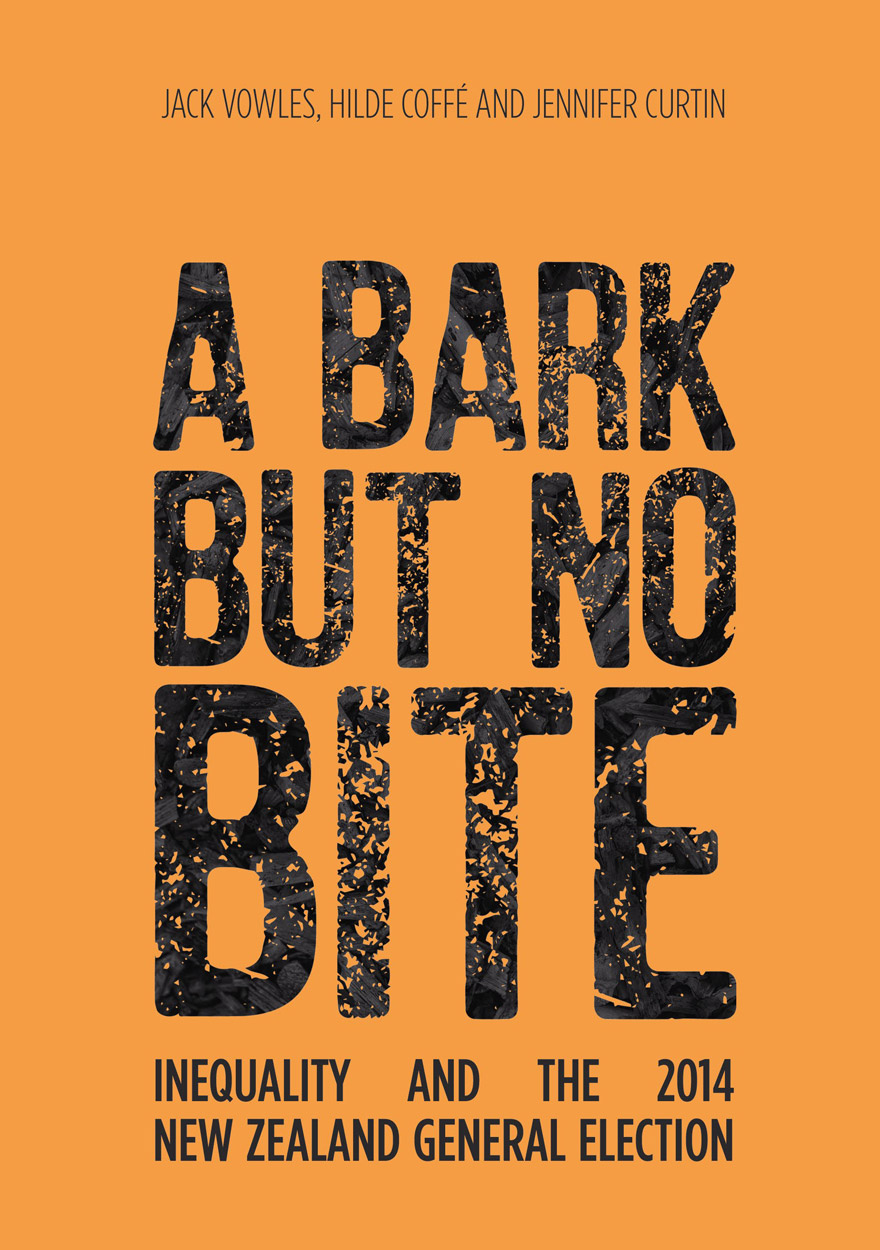
A Bark But No Bite »
Inequality and the 2014 New Zealand General Election
Publication date: August 2017
Based on New Zealand Election Study (NZES) data from a sample of 2,830 eligible voters, A Bark But No Bite explores a puzzle. While there was a lot of talk about inequality before the 2014 general election in New Zealand, and during the campaign, concern about inequality appeared to have no tangible effect on the election outcome. This book shows that, by its attention to the concerns of middle ground voters, the National Government had reduced the potential of policy differences to drive voter choices. Perceptions of competence and effective leadership were National’s strongest suit, crowding out voter concerns over matters of policy. When voters did consider policy, inequality and related concerns were second to the economy. Traditional priorities about health and education, and perceptions of party differences on these matters, had faded into the background.
Meanwhile, voters doubted the opposition Labour Party’s ability to govern effectively in an alternative coalition to that of the National-led government. Labour’s policies were too many. In various ways, they would have chipped away at inequality, but lacked a coherent narrative and presentation. This book confirms that Labour’s proposal to increase the age for receipt of New Zealand superannuation gained Labour no new votes.
Hopes that the ‘missing million’ people who failed to turn out to vote in 2011 would vote in 2014 and give an advantage to the left were unfulfilled. A comprehensive study of the 2014 election, this book provides a detailed account of all these findings, and a host of others.

New Worlds from Below »
Informal life politics and grassroots action in twenty-first-century Northeast Asia
Edited by: Tessa Morris-Suzuki, Eun Jeong Soh
Publication date: March 2017
In Asia today, the grand ideologies of the past have lost their power over the popular imagination. Even in many of the region’s democracies, popular engagement in the political process faces profound challenges. Yet amidst this landscape of political disenchantment, groups of ordinary people across Asia are finding new ways to take control of their own lives, respond to threats to their physical and cultural survival, and build better futures. This collection of essays by prominent scholars and activists traces the rise of a quiet politics of survival from the villages of China to Japan’s Minamata and Fukushima, and from the street art of Seoul and Hong Kong to the illegal markets of North Korea. Introducing an innovative conceptual framework, New Worlds from Below shows how informal grassroots politics in Northeast Asia is generating new ideas and practices that have region-wide and global relevance.



